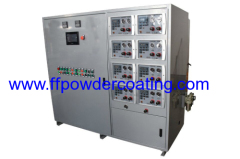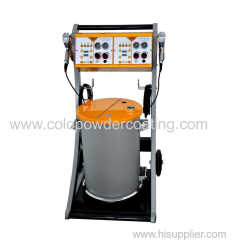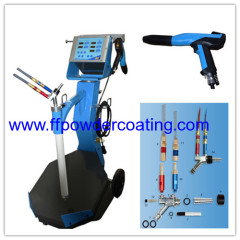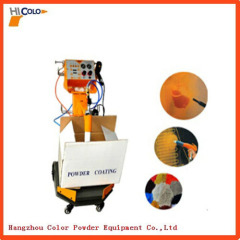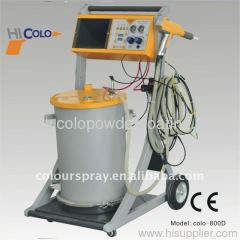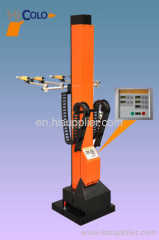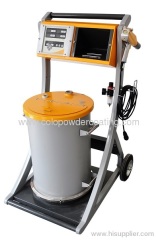
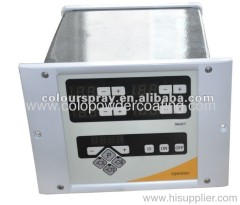
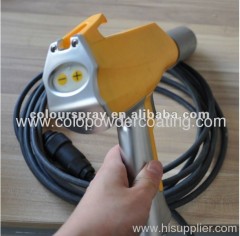
Optiflex powder coating unit
| Min. Order: | 1 Piece/Pieces |
|---|---|
| Payment Terms: | T/T |
| Supply Ability: | 200Piece/Pieces Per Month |
| Place of Origin: | Zhejiang |
Company Profile
| Location: | Hangzhou, Zhejiang, China (Mainland) |
|---|---|
| Business Type: | Manufacturer, Distributor/Wholesaler |
Product Detail
| Model No.: | colo-opti |
|---|---|
| Means of Transport: | Ocean |
| Brand Name: | colo |
| type: | Coating Spray Gun |
| gross weight: | 80kgs |
| kind: | one-touch intelligent |
| Dimension(L*W*H): | :L120cm,W 78CM,H 73CM |
| Material / Metal: | Steel,all metallic surface |
| Voltage: | 220v/110v |
| Power(W): | 50W |
| Certification: | CE/ISO |
| After-sales Service Provided: | Overseas service center available |
| Warranty: | 1 YEAR |
| Production Capacity: | 200Piece/Pieces Per Month |
| Packing: | wood box or carton box |
| Delivery Date: | 15 days |
Product Description
Specifications
1,Optiflex powder coating unit REPLACEMENT 2,100% interchangeable with original
3,Coating: Powder Coating
4,0-100KV
Optiflex powder coating unitREPLACEMENT
Wemanufacture the powder coating equipment,powder coating machine,powdercoating gun,powder coating system,powder coating line,powder coatingplant,electrostatic powder coating equipment, electrostatic powdercoating machine, electrostatic powder coating gun, electrostatic powdercoating system, electrostatic powder coating line, electrostaticpowdercoating plant, electrostatic powder spray gun.

Optistar control unit of the powder coating equipment



Optistar control unit of the powder coating equipment


Manual coating equipment Function description
the powder gun through the powder hose . The powder is electrostatically
charged at the nozzle of the gun. In addition, an electrostatic field is
created between the gun nozzle and the grounded object. The charged
powder spray remains adhered to the surface of the object.
The powder is fluidized by air forced through a porous plastic plate from
below. The powder acquires, thereby, fluid-like characteristics.
The conveying air, supplementary air, and rinsing air are set on the control
Unit
Theprocess of the coating is like this: The powder is fluidized in thepowder hopper. The injectors transport the powder through the hoses tothe guns. The guns spray a powder/air mixture onto the workpieces
COLOPowder Coating Systems is a top supplier of powder coating systems andpowder coating equipment including manual powder coating equipment,automatic equipment, spray booths,ovens and spare parts for itw gema,wagner, nodrson, kci famous brand in China.
China Powdercoating gun, China powder coating machine, China powder coating system,China powder coating equipment, powder coating control unit
.
A Brief About Powder Coating
Powdercoating is a dry finishing process, using finely ground particles ofpigment and resin that are generally electrostatically charged andsprayed onto electricallygrounded parts. The charged powder particlesadhere to the parts and are held there until melted and fused into asmooth coating in a curing oven. Before coating, the parts to be coatedare first pretreated similarly to conventional liquid coated parts. Thepretreatment process is normally conducted in series with the coatingand curing operatios.
There is essentiallytwo common ways of applying powder coating: by electrostatic spray andby fluidized bed powder coating. There are several other processes thathave been developed, but they are far less used. These include flamespraying, spraying with a plasma gun, airless hot spray, and coating byelectophoretic deposition.
To get an overview of the technology used in the powder coating industry click on the items below:
To get an overview of the technology used in the powder coating industry click on the items below:
- pretreatment
- Electrostatic Spray
- curing
Pretreatment.
Phosphating,or conversion coating, is the application of an iron or zinc phosphatecoating to the substrate. Conversion coating can be a very critical partof the pretreatment process, adding significantly to the performance ofthe finished coating. A phosphate coating converts the metal substrateto a uniform, inert surface, which improves bonding, minimizes thespread of oxidation if the coating is scratchedand improves the overallcorrosion resistance of the final part.
Aconversion coating can be iron, zinc, polycrystalline, chromate, ormanganese phosphate film. They are developed on both ferrous (ironbased) and non-ferrous surfaces (zinc, aluminum, terne and manganese).Parts are subjected to an acidic bath and a chemical conversion forms acomplete film on the part surface, changing the chemical and physicalnature of the metal surface.
Henkelhasintroduced a big breakthrough in surface treatment: Bonderite NT – anew surface pretreatment which is considerably more efficient, lesscomplicated and more cost-effective than conventional iron phosphating
Electrostatic Spray
Electrostaticspray powder coating uses a powder-air mixture from a small fluidizedbed in a powder feed hopper. In some cases, the feed hoppers vibrate tohelp prevent clogging or clumping of powders prior to entry into thetransport lines. The powder is supplied by a hose to the spray gun,which has a charged electrode in the nozzle fed by a high voltage dcpower.
Electrostatic powder spray guns direct theflow of powder; control the deposition rate; control the pattern size,shape, and density of the spray; and charge the powder being sprayed.The spray guns can be manual (hand-held) or automatic, fixed orreciprocating, and mounted on one or both sides of a conveyorized spraybooth. Electrostatic spray powder coating operations use collectors toreclaim over-spray. This reclaimed powder is then reused, addingsignificantly to the powder coating's high transfer efficiency.
Thereare various gun designs that mainly differ in the method of applyingelectrostatic charge to the powder. In some cases, the powder iselectrostatically charged by friction. The advantage is that the powderis free to deposit in an even layer over the entire surface of the part,and deposition into recesses is improved.
The filmthickness is dependent on the powder chemistry, preheat temperature,and dwell time. Film thicknesses of(40 - 60 µm) in case of plainpowder ( 80 – 100 µm) in case of texture can generally be applied on products.
Curing
Whena thermoset powder is exposed to elevated temperature, it begins tomelt, flows out, and then chemically reacts to form a higher molecularweight polymer in a network-like structure. This cure process, calledcross linking, requires a certain degree of temperature for a certainlength of time in order to reach full cure and establish the full filmproperties for which the material was designed. Normally the powderscure at 200°C (390°F) in 10 minutes. The curing schedule could varyaccording to the manufacturer's specifications.
The application of energy to the product to be cured can be accomplished by convection cure ovens or infrared cure ovens.


